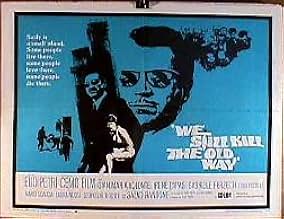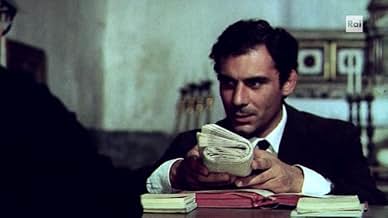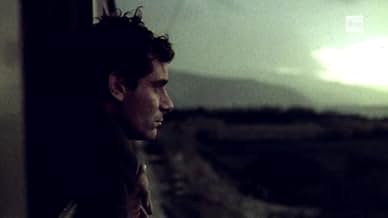Agrega una trama en tu idiomaIn Sicily, a leftist professor investigates the "honor killings" of two friends, uncovering a tangled web involving politicians, the Mafia, the Church, and the widow of one of the victims.In Sicily, a leftist professor investigates the "honor killings" of two friends, uncovering a tangled web involving politicians, the Mafia, the Church, and the widow of one of the victims.In Sicily, a leftist professor investigates the "honor killings" of two friends, uncovering a tangled web involving politicians, the Mafia, the Church, and the widow of one of the victims.
- Dirección
- Guionistas
- Elenco
- Premios
- 6 premios ganados y 2 nominaciones en total
- Dirección
- Guionistas
- Todo el elenco y el equipo
- Producción, taquilla y más en IMDbPro
Opiniones destacadas
This marks the first collaboration between director Elio Petri, writer Ugo Pirro and actor Gian Maria Volonte which was to bear fruit in the extraordinary 'Indagine su un cittadino al di sopra di ogni sospetto' and is loosely adapted from the novel by Leonardo Scascia who was again to provide the source material for Rosi's stupendous 'Cadaveri Eccellenti'.
Scascia's novel was inspired by the assassination of a policeman by the Mafia and here Petri and his cinematographer Luigi Kuveiiller have created a striking contrast between the ravishing Sicilian scenery and the all-pervading corruption although there is perhaps a little too much use made of the 'zoom'.
Excellent script and taut editing with strong performances from Volonte, Gabriele Ferzetti, both of whom were awarded Silver Ribbons, the striking Irene Papas whose role does not really do justice to her talents and a marvellous cameo by Petri regular Salvo Randone as a blind oculist!
Petri's customary Left-leaning social criticism is in evidence here but what should have been a top class film is alas, for this viewer at any rate, weakened by imperfect post-synchronisation and some distinctly dodgy dubbing. The genius of Ennio Morricone is conspicuous by its absence here as the score by Luis Bacalov is intrusive, badly integrated and undermines rather than underlines the film's effectiveness.
Scascia's novel was inspired by the assassination of a policeman by the Mafia and here Petri and his cinematographer Luigi Kuveiiller have created a striking contrast between the ravishing Sicilian scenery and the all-pervading corruption although there is perhaps a little too much use made of the 'zoom'.
Excellent script and taut editing with strong performances from Volonte, Gabriele Ferzetti, both of whom were awarded Silver Ribbons, the striking Irene Papas whose role does not really do justice to her talents and a marvellous cameo by Petri regular Salvo Randone as a blind oculist!
Petri's customary Left-leaning social criticism is in evidence here but what should have been a top class film is alas, for this viewer at any rate, weakened by imperfect post-synchronisation and some distinctly dodgy dubbing. The genius of Ennio Morricone is conspicuous by its absence here as the score by Luis Bacalov is intrusive, badly integrated and undermines rather than underlines the film's effectiveness.
A left-wing professor stressed by moral doubts (Gian Maria Volonté) has the rather strange idea to try to break the ambiant omerta in order to clear the violent death of two friends, honor issues happening just to conceal quite more material interests. But Sicily and its little folk of mute but watchful characters don't seem ready to accept this kind of trouble. Bound with beauty but ungraspable like the doctor's few disconsolate widow (Irene Papas), the island and its stifling sun know how to subdue the one who dares to upset their immutably established order, between a conspicuous church and an invisible mafia.
"A Ciascuno il suo" is based on the homonymous book by Leonardo Sciascia, and just like many of the author's books is an unconventional detective story aimed at unveiling the hypocrisy and immorality of Sicilian society. The story begins with a man showing his friends a few threat letters. A few days later he gets shot together with one of his friends, a chemist. The murder is filed under "honour crime" (delitto d'onore) a murder committed out of passion and jealousy, and a peasant is convicted for it. Gian Maria Volonté is an awkward school professor who believes in the peasant's innocence, and decides to investigate the crime. His infatuation with the beautiful wife of the victim also plays a part in his decision to solve the mystery. As the story unveils, he will discover unpleasant truths, but will continue with the investigation despite all dangers. Volonté is as formidable as always, changing his accent and posture to fit the part. But the real protagonist is the Sicilian landscape in all its harsh brightness. The cinematography is such that we can almost feel the wind, the sun and the dryness of the air. When I first watched this film I wondered whether anyone who was not Sicilian or familiar with Sciascia's writing would understand all its complexity, but Elio Petri does a masterful job in transposing the book.
At the beginning of the movie a pharmacist receives an anonymous letter that threatens him of death. And the murder actually happens. Seems very simple but nothing is what it seems and the journey to the truth will be long and difficult. The book is excellent and the movie is at par with it and very faithful to the romance. Great direction. Incredible cast with Gabriele Ferzetti in his best interpretation together with the one in "C'era una volta il West" and Gianmaria Volonté simply beyond reach as always. Many other great actors. Yes I am an enthusiast 'cause there's not a word or a shot out of place in this movie and the plot is ingenious. Who is going to see this film for the first time will be taken away by the developments (the pace seems to be calm but looking in between the kinks you may realize that many things are going rapidly on). Trying to figure out what is the kernel of the happenings and the "reasons" for the murder is a very interesting exercise but it's highly unlikely for the spectator not to experience a big surprise at the end. In my opinion Elio Petri at his best (I mean at the same level of his other masterwork: La classe operaia va in Paradiso).
Gian Marie Volonte's got himself into some hot water this time! Doesn't he know that in Sicily, if someone gets murdered, you just keep your trap shut and let whoever the police randomly arrest go to jail?
Luigi Pistilli keeps getting letters telling him he's a dead man, and its making him a bit paranoid. Nevertheless, one morning he says goodbye to his wife, then his lover, and sets off with his friend to go hunting, only to find himself the prey. Two corpses later, we've got a bit Sicilian funeral to go to while the police chat about the people attending, including a well-respected lawyer (Gabriele Ferzetti) who's cousin (Irene Papas) was married to one of the victims, and Gian Marie Volonte, a professor friend of the two who starts poking in places that should not be poked.
Pistilli is generally thought to be the target as he was a bit of a fanny rat and some family members are arrested, but they are all illiterate so how could they cobble together those threatening letters. Volonte also finds that the words in the letter were from a Vatican-based newspaper, which leads him to the priesthood. Oh, and a lot of people are related in this film, so one of the priests is the uncle of Papas and Ferzetti.
It's a formula you'll see a lot of in these films, so it's just as well the lead actors are good! Volonte has the hots for the widow Papas and has to basically restrain himself every times he meets her, while Papas kind of has the hots for him too, leading to all kinds of awkward moments. Volonte is very good at the bookish professor who is just too smart and curious for his own good, while Papas just smoulders as the widow.
It looks absolutely scorching hot in Sicily in this film, and just like Damiano Damiani's Day of the Owl, the island itself is a character, with all the strange culture that lives on its land.
The only let down of the film is that the plot is a bit predictable, but it's by no means a bad film.
Luigi Pistilli keeps getting letters telling him he's a dead man, and its making him a bit paranoid. Nevertheless, one morning he says goodbye to his wife, then his lover, and sets off with his friend to go hunting, only to find himself the prey. Two corpses later, we've got a bit Sicilian funeral to go to while the police chat about the people attending, including a well-respected lawyer (Gabriele Ferzetti) who's cousin (Irene Papas) was married to one of the victims, and Gian Marie Volonte, a professor friend of the two who starts poking in places that should not be poked.
Pistilli is generally thought to be the target as he was a bit of a fanny rat and some family members are arrested, but they are all illiterate so how could they cobble together those threatening letters. Volonte also finds that the words in the letter were from a Vatican-based newspaper, which leads him to the priesthood. Oh, and a lot of people are related in this film, so one of the priests is the uncle of Papas and Ferzetti.
It's a formula you'll see a lot of in these films, so it's just as well the lead actors are good! Volonte has the hots for the widow Papas and has to basically restrain himself every times he meets her, while Papas kind of has the hots for him too, leading to all kinds of awkward moments. Volonte is very good at the bookish professor who is just too smart and curious for his own good, while Papas just smoulders as the widow.
It looks absolutely scorching hot in Sicily in this film, and just like Damiano Damiani's Day of the Owl, the island itself is a character, with all the strange culture that lives on its land.
The only let down of the film is that the plot is a bit predictable, but it's by no means a bad film.
¿Sabías que…?
- TriviaFilm debut and only film performance of Anna Rivero.
- ConexionesEdited into Lo schermo a tre punte (1995)
- Bandas sonorasPour rêve l'hiver
("A Dream for Winter") (uncredited)
Lyrics by Arthur Rimbaud
Music by Luis Bacalov
Sung by Léo Ferré
Selecciones populares
Inicia sesión para calificar y agrega a la lista de videos para obtener recomendaciones personalizadas
- How long is We Still Kill the Old Way?Con tecnología de Alexa
- Watch the trailer online
Detalles
- Tiempo de ejecución1 hora 39 minutos
- Mezcla de sonido
- Relación de aspecto
- 1.85 : 1
Contribuir a esta página
Sugiere una edición o agrega el contenido que falta

Principales brechas de datos
By what name was A ciascuno il suo (1967) officially released in Canada in English?
Responda

























